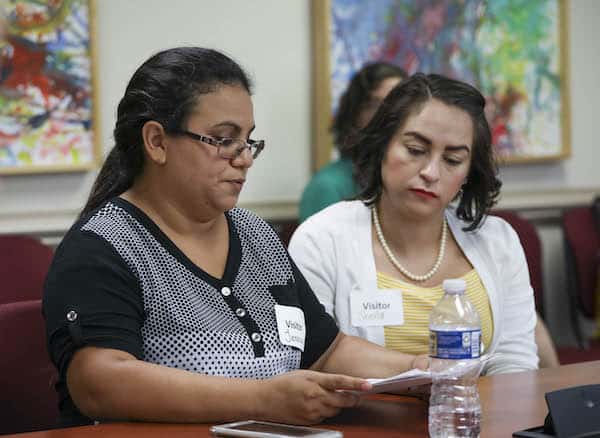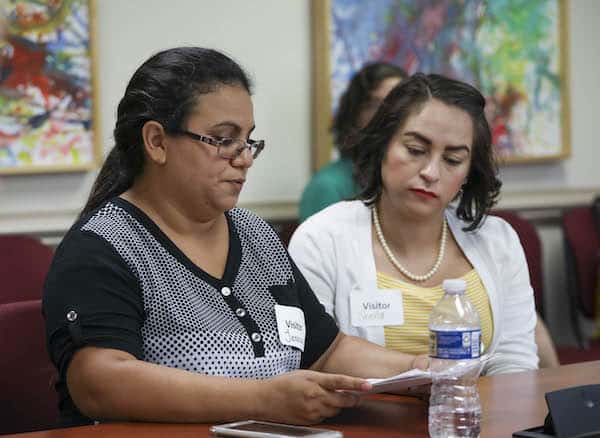Parents of kids with special needs stand together
By Fawn Pattison
Lea este blog en español a continuación

Jessica is a mother of twins with autism, and a member of NC Child’s Parent Advisory Council, from Union County, North Carolina. She is a community organizer and passionate advocate for families whose children have special health care needs. At a recent Parent Advisory Council meeting, we talked about NC Child’s theme that “We value every child,” and asked members what that meant to them. Here’s how Jessica thinks about it:
NCC: At NC Child, we value every child. What does that mean to you?
Jessica: “My kids have special needs. For me, I have had to do a lot to process this and say to myself, “Hey, I can do this. And my kids, they can do this.” They have so many feelings, they are scared and everything, but I need to find that one part of me and say, one diagnosis does not define my kid.
“I do a lot of work with other parents in my community. And I see that other parents who have kids with special needs, they need help because of language, need help because they don’t have any idea where they need to go to get the assistance they need in everything. That’s why I’m working with other parents and started a group in Union County for families with special needs.
“Because they all need to see that other people understand. They need to help each other with where you need to go, what you need to do to get the care and the services they need. Most of all they need to know that other persons feel the same thing that they feel. People whose kids don’t have special needs sometimes don’t understand what you feel, or what you live everyday with your kids.”
“Special children are not seeking pity for their disease or their condition, but acceptance, respect and love.”
NCC: So is that a role that you play for other parents in your community? Helping them see that that one factor like a diagnosis, or immigration status, does not define the whole person?
Jessica: “Yes, exactly.
“The most important thing [for parents of kids with special needs] is that you’re working hard, and your advocacy for your kids. You can do wonderful things for your kid. One of my sons has more severe autism than the other one, and the doctors said he would probably never talk. He started talking at 4 1/2 years. Now when you talk with him, it’s a big conversation.
“It’s not only that he has the therapy. You need to go back and reinforce everything. That’s my point with these [family support] groups. I want the parents and the children to know that one diagnosis does not define your child. You need to work hard with them and try to reinforce the therapy. Parents need to feel that they have help, and they have others to have your back and help with everything.
“I see parents are very scared about their immigration status and kids with special needs. Sometimes they don’t take their kids to the therapist because they don’t want to drive. That’s why for me transportation service is very important, because a lot of parents don’t get the services for their kids because they’re scared to go out.
“It’s really hard. Kids with special needs understand what is happening around them. And they’re scared too. The police is not something to be scared of, they need to know that the police are there for helping, not for taking your parents away. It’s pretty hard to see this. Other kids in the school say to them, “Your father will get taken away because you’re immigrants.” That’s not an idea that your kids need to know.
“Every child is psychologically and emotionally harmed by separating him from his parents. But in the case of special children it is worse because he needs not only care, love and respect from his caregiver, but he needs to be with those who understand and accept him as he is, and who will work with him to achieve the best quality of life possible. Separating them from their parents means putting them in a system where almost no one wants that responsibility. This can cause them to have a setback in their advances, and not get what they need for full development, in and out of school. This country is creating emotionally broken children who will not trust authorities in the future.
“Every person is unique. All persons have value. We need to show the kids that all people are equal, and we are all here to help each other.”
Jessica and the other Parent Advisory Council members recently met with DHHS Secretary Mandy Cohen and a team from DHHS working on Medicaid Transformation. Jessica shared her story to help the Department understand that improving the quality and consistency of Medicaid transportation services is critical to child health. NC Child and Parent Advisory Council members will continue to advocate for families throughout the state’s transformation of Medicaid to Managed Care.
Fawn Pattison is NC Child’s Communications Director
Support NC Child’s work to ensure health and wellness for all NC’s children. Click here to make a donation today.
“Lo más importante es su defensa de sus hijos”
Los padres de niños con necesidades especiales se unen
Por Fawn Pattison

Jessica es madre de gemelos con autismo, y miembro del Consejo Asesor de Padres de NC Child, del Condado de Union, Carolina del Norte. Es una organizadora comunitaria y apasionada defensora de las familias cuyos hijos tienen necesidades especiales de atención médica. En una reciente reunión del Consejo Asesor de Padres, hablamos sobre el tema de NC Child de que “Valoramos a cada niño”, y preguntamos a los miembros qué significa eso para ellos. Así es como Jessica lo piensa:
NCC: En NC Child, valoramos a todos los niños. ¿Qué significa eso para ti?
Jessica: “Mis hijos tienen necesidades especiales. Para mí, he tenido que hacer mucho para procesar esto y decirme a mí mismo, “Oye, puedo hacer esto. Y mis hijos, pueden hacer esto”. Tienen tantos sentimientos, están asustados y todo eso, pero necesito encontrar esa parte de mí y decir que un diagnóstico no define a mi hijo.
“Trabajo mucho con otros padres de mi comunidad. Y veo que otros padres que tienen hijos con necesidades especiales, necesitan ayuda debido al lenguaje, necesitan ayuda porque no tienen idea de dónde tienen que ir para obtener la ayuda que necesitan en todo. Es por eso que estoy trabajando con otros padres y comencé un grupo en el Condado de Union para familias con necesidades especiales.
“Porque todos necesitan ver que otras personas entienden. Necesitan ayudarse mutuamente con a dónde usted necesita ir, lo que necesita hacer para obtener la atención y los servicios necesarios. Sobre todo, necesitan saber que otras personas sienten lo mismo que sienten. Las personas cuyos hijos no tienen necesidades especiales a veces no entienden lo que sientes, o lo que vives todos los días con tus hijos”.
Los niños especiales que tienen una enfermedad o una condición no buscan piedad sino aceptación, respeto y amor.
NCC: Entonces, ¿es ese un papel que usted desempeña para otros padres en su comunidad? ¿Ayudarles a ver que un factor como un diagnóstico, o estatus migratorio, no define a toda la persona?
Jessica: “Sí, exactamente.
“Lo más importante para los padres de niños con necesidades especiales es que deben trabajando duro en defensa de sus hijos. Puedes hacer cosas maravillosas por tu hijo. Uno de mis hijos tiene autismo más severo que el otro, y los médicos dijeron que probablemente nunca hablaría. Empezó a hablar a los 4 años y medio. Ahora, cuando hablas con él, es una gran conversación.
“No es sólo que tiene la terapia. Tienes que volver atrás y reforzar todo. Ese es mi punto con estos grupos [de apoyo familiar]. Quiero que los padres y los niños sepan que un diagnóstico no define a su hijo. Tienes que trabajar duro con ellos y tratar de reforzar la terapia. Los padres necesitan sentir que tienen ayuda, y tienen a otras personas para respaldarlos y ayudar con todo.
“Veo que los padres están muy asustados por su estatus migratorio y por sus niños con necesidades especiales. A veces no llevan a sus hijos al terapeuta porque no quieren conducir. Es por eso que para mí el servicio de transporte es muy importante, porque muchos padres no reciben los servicios para sus hijos porque tienen miedo.
“Es muy difícil. Los chicos con necesidades especiales entienden lo que está sucediendo a su alrededor. Y ellos también están asustados. La policía no es algo que temer, necesitan saber que la policía está ahí para ayudar, no para llevarse a sus padres. Es muy difícil ver esto. Otros niños de la escuela les dicen: “A tus padres se los llevaran porque son inmigrantes”. Esa no es una idea que tus hijos necesitan saber.
“Cada niño es psicológica y emocionalmente lastimado al separarlo de sus padres. En el caso de los niños especiales, es peor porque no sólo necesita cuidado, amor y respeto de su cuidador, sino que lo entiende y lo acepta como es y trabaja con él para lograr la mejor calidad de vida posible. Al separarlos de sus padres significa provocar un descontrol de seguridad y emocional en sus vidas poniéndolos en un sistema donde casi nadie quiere esa responsabilidad. Haciendo que tengan un revés en sus avances y no tengan todos los servicios que necesitan para un desarrollo completo dentro y fuera de la escuela. Este país está generando niños emocionalmente rotos que no confiarán en las autoridades para el futuro.
“Cada persona es unica. Todas las personas tienen valor. Tenemos que mostrar a los niños que todas las personas son iguales, y todos estamos aquí para ayudarnos unos a otros”.
Jessica y los otros miembros del Consejo Asesor de Padres se reunieron recientemente con la secretaria de DHHS Mandy Cohen y un equipo de DHHS que trabaja en la Transformación de Medicaid. Jessica compartió su historia para ayudar al Departamento a entender que mejorar la calidad y la consistencia de los servicios de transporte de Medicaid es fundamental para la salud infantil. Los miembros del Consejo Asesor de Niños y Padres de NC continuarán abogando por las familias en todo el estado para transformar la atención de Medicaid to Managed care.
